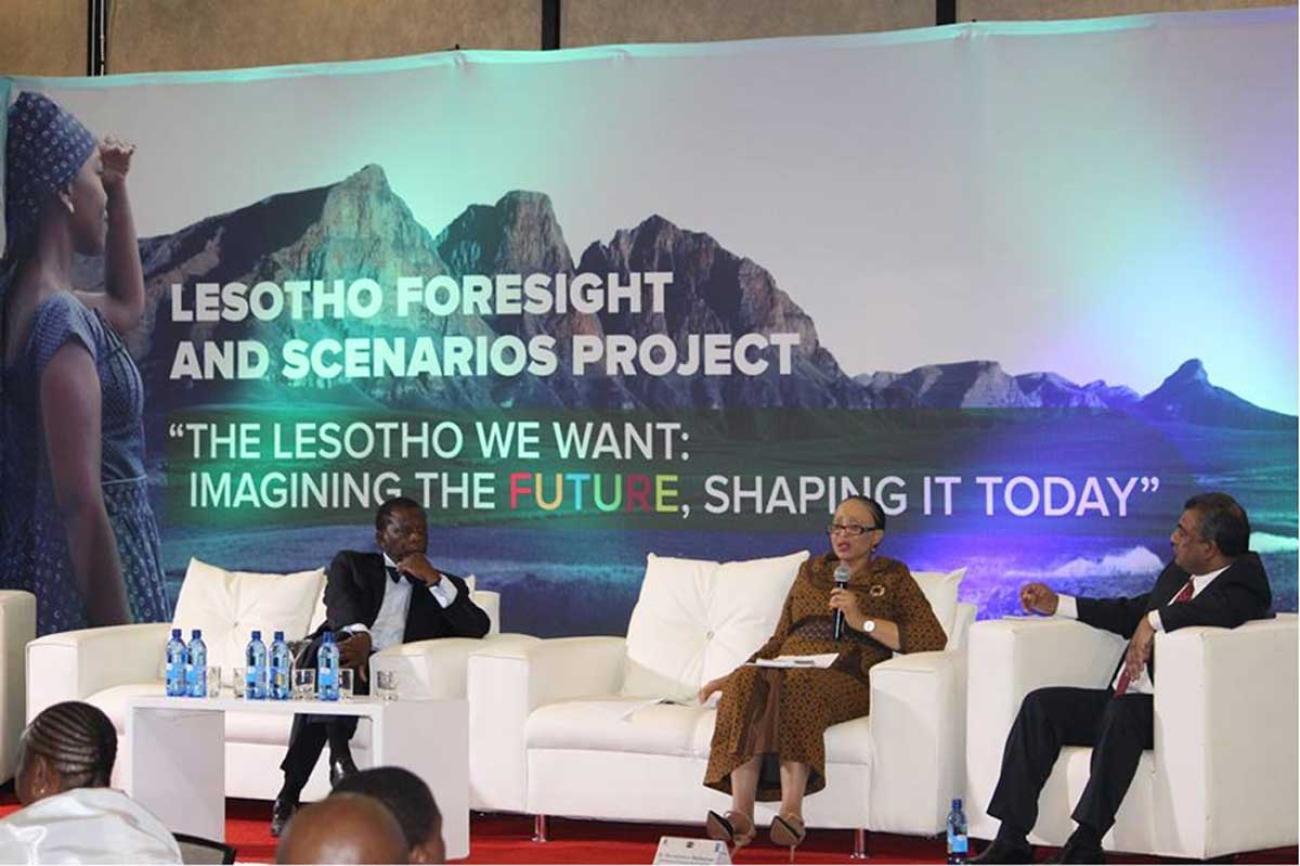Lesotho Foresight and Scenarios Project is Launched in Maseru

Phase that would include a series of validation and writers training workshops which will be followed by the scenarios development process in September 2017.
The Lesotho Foresight and Scenarios Project (LFSP), a unique collaborative project between the Government of Lesotho, the National University of Lesotho (NUL) and the United Nations Development Programme (UNDP), was launched in Maseru 10-12 April. The project will be implemented over a period of one year under the theme, “The Lesotho we Want: Imagining the Future, Shaping it Today.” The project comes at a time when Lesotho is preparing for a third national election in just over 5 years.
Speaking at the launch on 10 April, the Minister for Development Planning Hon. Semano Sekatle said that the project would be of “vital significance in our efforts to focus on developing and eventually implementing these developmental frameworks to meet national objectives.” He expressed the hope that the project would “help the country improve the quality of its decision-making. This is to say that foresight and scenario planning will provide guidance for strategic action being taken today, not only what to do, but how and where to do it. It will allow the country to make strategic policy decisions based on a greater variety of knowledge sources.”
Ms. Christy Ahenkora, UNDP Resident Representative a.i. in Lesotho, noted that the LFSP builds on previous engagements between the GoL and the UN, and especially the GoL and UN High-Level Round Table (HRT) which was held in July 2016 under the theme, “Transformation and Reform: The Path to Lesotho’s Sustainable Development.” Among other things, the HRT concluded with a call to continue and deepen the dialogue among Basotho stakeholders on the way forward for the country. The HRT also emphasized the centrality of governance to sustainable stability, peace and development.” Ms. Ahenkora further noted that the LFSP is intended to spur thoughtful dialogue on Lesotho’s development pathways into the future and will contribute to the efforts of the Lesotho United Nations Country Team to support both strategic national development and building of capacities within national institutions.
Speaking on behalf of the National University of Lesotho (NUL), the Vice-Chancellor, Professor Nqosa Mahao, argued that Lesotho’s main developmental challenges all boil down to the issue of poor leadership. The Vice-Chancellor announced that the NUL is at an advanced stage of establishing the Moshoeshoe I Institute of Leadership which “will seek to invoke the spirit of Morena Moshoeshoe I, the visionary and ethical founder of the Basotho nation, and serve as a think-tank on matters of leadership to address issues relating to nation-building, inclusive socio-economic development and the importance of political stability.”
The launch was attended by over 200 participants from the government, private sector, civil society, academia, development partners and international experts on the foresight and scenario building. The key note speaker, Advocate Vasu Gounden from the African Centre for the Constructive Resolution of Disputes (ACCORD) in South Africa, spoke on global and continental political trends, socio- economic trends, technological advancements and their impact on society and development, and strongly urged Basotho to study these trends to discern their implications for the Kingdom and identify decisions needing to be made and capacities built to secure future prosperity and stability. Prominent speakers included amongst the others Dr. Rets’elisitsoe Matlanyane, the Governor of the Central Bank of Lesotho; Mr. Majakathata Mokoena-Thakhisi, the Principal Secretary of the Ministry of Development Planning; Archbishop Gerald Tlali Lerotholi of the Catholic Archdiocese of Maseru; and former finance Minister Dr. Tim Thahane. Speaking to wide applause, Dr. Deborah Raditapole, a former Minister of Health, enthused that as long as politics are seen as an easy way to riches and not the development of Lesotho and Basotho, political instability will persist for a long time.
Several panelists spoke on the theme: Khotso, Pula, Nala: A lived national philosophy or just a slogan?” They included the Curator of the Morija Museum, Stephen Gill who spoke on legacy of King Moshoeshoe 1. He noted: “Leadership is fundamentally about creating the conditions for the success of many, about spreading the benefits and reducing the risks faced by those who are vulnerable. Moshoeshoe for example used mafisa very effectively as a tool to empower many while ts’imo ea lira and other mechanisms were used as safety nets for the indigent and during times of drought.” Speaking as a young Mosotho, Ms. Likeleli Monyamane said: “We want a country that is ready for us: Ready to take us through the different stages of development as young people, and to develop us holistically, a country that is ready to channel the talents, skills and passion of the youth of any generation at any given point, and we are ready, willing and able to participate in creating that future.” Civil society leaders Ms. Libakiso Matlho and Mr. Sofonea Shale spoke equity and equality for all, and on citizen participation and responsibility, respectively.
International experts on foresight and scenario planning conducted a two-day scenarios methodology workshop on 11-12 April and shared experiences from Kenya, Uganda, Tanzania and Macedonia as well as on linking the LFSP to the national planning processes and to the Sustainable Development Goals (SDGs).
According to George Wachira, the UN Peace and Development Advisor in Lesotho, the LFSP will include a research phase focusing on key trends and their implications for Lesotho’s future development, followed by a scenarios development phase and finally dissemination and application. The initiative has now entered its research.


